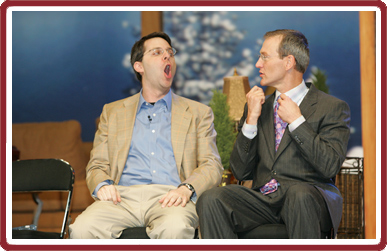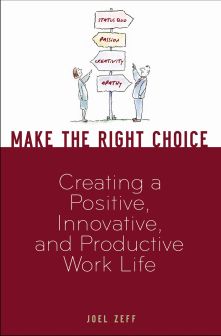
Remember in high school art class, when you learned that two parallel lines like railroad tracks converge in the distance?
Joel Zeff’s career path looks like that, with his day jobs as a reporter and PR guy merging with his hobby as a stand up comedian and improv troupe member in his current incarnation as a motivational speaker.
The beauty of the story — the thing that’s reassuring for the rest of us — is that he didn’t set out with a plan to merge his interests. In fact, he had no idea people made a living doing what he’s doing today. He just followed the old adage of doing what he loved and letting the details sort themselves out.
I’ve heard that a million times and often the type A/ practical part of my brain chimes in “It’s all well and good to do what you love, but if it’s not something people will pay you for, that’s not a job. It’s a hobby.” Joel’s story resonates for me because he was being practical, paying the bills with a day job he was good at, while he continued to do the thing he loved on the side — and slowly realized he could bring his creative self together with his practical self and do something new.
It’s encouraging because it suggests you don’t need to live on a park bench and singlemindedly pursue your passion to have it happen. Nor do you have to know exactly where you’re headed to end up achieving your goal. Just do what you love and pay attention when opportunities present themselves.
Let me go back to the beginning.
I met Joel when he was a reporter at my hometown paper, the Saginaw News, and I was a newsroom intern. Joel felt he was destined for bigger and better things than my hometown paper, so the first chance he got, he left for the Dallas Times Herald.
Six months later, the paper folded. A feature story about Joel in the paper’s crosstown rival, the Dallas Morning News, says:
The demise of the Dallas Times Herald was the best thing that ever happened to Mr. Zeff’s career – although he didn’t think so at the time.
“I jumped on board the Titanic just as it set sail,” Mr. Zeff says. “I was at the Times Herald for the last six months of its voyage.”
Joel said that in spite of being 23 and unemployed, getting laid off felt like “a huge door just opened.”
He applied for newspaper jobs with no success. With free time to spare, he started doing stand up comedy and taking improv classes, but since he couldn’t see how that was going to pay the rent, he went to plan B and began applying for public relations jobs.
Joel relatively quickly landed one PR job, then got recruited to another firm, and discovered he liked the work and enjoyed learning how the corporate world worked. Meanwhile, he kept doing comedy for fun.
It was sort of a fluke when Texas Instruments, one of his clients, invited him to come to a corporate retreat and run some improv games for the executives. He enjoyed it, and TI liked him enough that they asked him to help provide some entertainment at a trade show.
Joel began to see that maybe these weren’t two separate things — his PR world and his comedy world — and that maybe he could ham it up for people’s enjoyment *and* get paid.
Joel started doing events talking about creativity or team work or the like, still as a sideline to marketing, until he decided in 1997 to videotape one of his events as a demo and send it out. He wrote about that in an email to me:
In 1997, I started focusing on it as part of my business. I taped one of my events. I started sending materials out to clients. And everything just kind of exploded. In the beginning, I would speak for little money and often for free. I was building a name and a reputation. Pretty soon clients were calling me. Speaker bureaus started representing me. The rest is history.

At his peak, Joel was doing about 80-100 events a year, but he’s pulled back some to spend more time with his family, now doing 65-80 dates for crowds up to 6,000 people. And he has a new book out so he’s spending more of his energy promoting that.
Typically I try to have a sort of Aesop’s Fables moral to each story. With Joel, you’re in luck — you get two.
First, figure out what you would do for free. Joel says for him, that’s improv. He told the Morning News:
“I always tell my clients, ‘The time I’m onstage is free. That’s what I love to do. You’re paying for me to be away from my family, to travel and deal with the airport, the accounting, the paperwork, the taxes and the research.’ “
Then, figure out how to make that thing you’d do for free into a business. For Joel, that meant doing speaking gigs for free to build exposure in the corporate world and hone his message, then using his business skills to promote himself and to manage his burgeoning career.
Once you figure out where the money is, go after it with intensity. Joel was willing to travel like crazy, shill via email, Web and media appearances, and squeeze in time to write a book, all the name of building his reputation. It was way more work than a standard 9-to-5 job, but that’s part of why it’s important to do what you love — if you love it, you aren’t looking at the clock and counting down ’til you can stop.
“Whatever you’re doing, that should be your passion,” Joel said. “I haven’t had a job since 1994.”
Want to read more? Check out Joel’s blog, if only for the pointers on doing a better presentation. The next crowd you don’t bore with a stiff PowerPoint show will thank you.
Then check him out on Fox and Friends talking about how to recession proof your career. That’s advice we all need, no?

